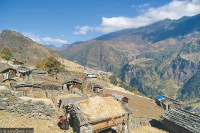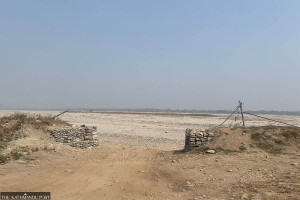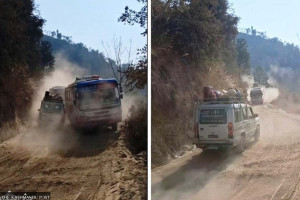Koshi Province
Rise of dengue cases in hill district of Tehrathum causes alarm
In the past week alone, 62 fever patients who visited the district hospital for treatment tested positive for dengue virus.
Chandra Karki
Nirmal Dahal and his wife suffered from high fever last week. For a week, the couple stayed at their home in Myanglung Municipality-1, Tehrathum and took paracetamol regularly. But when their fever did not subside even after three days of self-medication, the couple went to the district hospital.
The laboratory test at the hospital confirmed dengue infection in both of them. They are currently receiving treatment at the hospital.
Nirmal says he is shocked he has dengue, a mosquito-borne viral disease mostly spreading in warmer climes. “Tehrathum is a hill district, so being infected with dengue is quite shocking to me,” he said.
Similarly surprised is Ratnamaya Gimi of Myanglung-10 who is attending to her dengue-infected grandson at the district hospital. She said the infant was admitted to the hospital after he suffered from fever, vomit, dizziness, body ache and pain in the eyeballs. “His health is gradually improving,” Ratnamaya said. “But we still don’t know how it was possible for him to get infected with dengue. I believed dengue mosquitoes bred in warmer weather.”
Dengue appears to have spread far and wide in Tehrathum, said Dr Prerit Devkota, chief at the district hospital, adding that as many as 62 fever patients who visited the health institution for treatment in the past week tested positive for dengue virus.
“Such a huge number of dengue cases in a week in a hill district is worrisome,” Devkota said. “How does this disease, which is common in hot Tarai districts, climb to the hill district? It is an important matter to study.”
Dengue is a mosquito-borne disease transmitted by female Aedes aegypti and Aedes albopictus mosquitoes. The same vector, according to the World Health Organisation, also transmits chikungunya, yellow fever and Zika viruses.
Although the post-monsoon period is considered a high transmission season for the dengue virus, Nepal has witnessed outbreaks of the fatal disease in the pre-monsoon, monsoon and post-monsoon seasons in several districts.
Myanglung, the district headquarters of Tehrathum, lies at an altitude of around 1,600 metres above sea level. The local people are fearful as the dengue is taking its toll on Myanglung and its surrounding areas of late.
Federal Minister of Health Bhawani Prasad Khapung recently visited the district hospital in Tehrathum. He held discussions with the health workers in regard to controlling the disease. The health workers suspect that mosquitoes carrying dengue arrived in the district through vehicles coming from Tarai districts.
According to Devkota, most of the people suffering from dengue do not have a travel history to Tarai districts. Devkota argued that dengue is spreading as the drive to control mosquitoes from breeding is ineffective in the district. He underscored the need to launch an awareness drive about the disease and intensify campaigns to spray insecticide to control the mosquitoes.
Mosquitoes that cause dengue breed in clean water and infect people in daylight.
According to doctors, mild to high fever, severe muscle pain, rashes, severe headache, and pain in eyes are some of the symptoms of dengue.
The World Health Organisation says that there is no specific treatment for severe dengue, but early detection and access to proper medical care can lower the fatality rate.




 9.7°C Kathmandu
9.7°C Kathmandu












